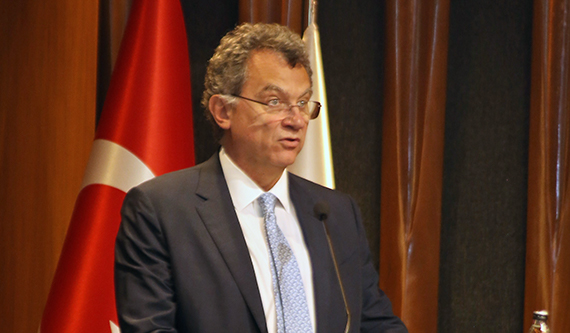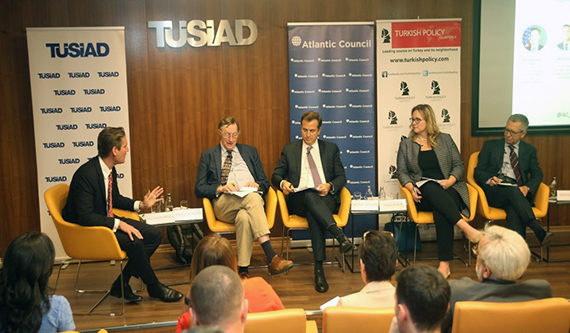On 23 May 2019, Turkish Policy Quarterly (TPQ) held a panel discussion, “Turkey’s Energy Nexus,” in collaboration with Atlantic Council IN TURKEY and hosted by TÜSIAD Istanbul. Thursday’s event was based on a joint special issue of TPQ published in Fall 2018, which was launched at Atlantic Council’s headquarters in D.C. in December. The President of TÜSİAD, Simone Kaslowski, provided the initial opening remarks, after which Representative and Director for Atlantic Council IN TURKEY, Defne Sadıklar Arslan, and Managing Editor of TPQ Ayşegül Erdem Ventura, also made welcoming remarks.

The panel featured:
Moderator:
Matthew Bryza, Nonresident Senior Fellow, Eurasia Center and Global Energy Center, Atlantic Council; Member of the Advisory Board, Turkish Policy Quarterly; Former US Ambassador to Azerbaijan
Speakers:
Murat Özyeğin, Vice President, TÜSİAD; Chairman of the Board, Fiba Enerji
Mithat Rende, Member of the Board of TSKB; Former Ambassador of Turkey to the OECD
Erika Olson, Economic Counselor, US Embassy to Turkey
John M. Roberts, Nonresident Senior Fellow, Eurasia Center and Global Energy Center, Atlantic Council; Member of the United Nations Economic Commission for Europe Group of Experts on Gas
Our moderator, Matthew Bryza, kicked off the conversation by posing the question of whether there is a convergence between the US and Turkish energy strategies. Erika Olson asserted that US energy policy has not changed significantly in the past 20 years and that if a project is commercially viable, it has US support. She also emphasized that the US continues to support efforts to reduce European reliance on Russian natural gas through energy development and diversity. In that vein, Russia’s Nord Stream II pipeline, which will bring Russian gas via Germany to Western Europe, and the second line of the TurkStream pipeline, moving Russian gas from Turkey to Europe, are not examples of source diversification and are therefore being watched with concern by Washington.
In discussing Turkey’s energy position, Mithat Rende stated that TurkStream will go towards feeding Turkey’s gas needs, particularly that of Istanbul. Speaking on tensions in the Eastern Mediterranean over gas exploration, Rende underlined that Turkey objects to the “unilateral and illegitimate exclusive economic zone claims of the Greek Cypriots.” Furthermore, he stated that Turkey does not recognize the EEZ agreements the Greek Cypriots concluded with Egypt, Lebanon, and Israel, arguing that the Greek Cypriots are not entitled to negotiate deals on behalf of the Turkish side of the island.

John M. Roberts touched on a number of important issues, including how Iran sanctions will affect energy flows. Roberts posited that US sanctions on Iran would affect Turkey and Iraq the most, and that they would have to develop alternative energy trade routes. Roberts indicated that it is very hard for an outside power such as the US to strike the right balance between Turkey and Iran because Turkey has to live with Iran as its neighbor. The question remains on how Turkey will maintain its national security if it goes too far in accepting US sanctions against Iran.

Murat Özyeğin focused his remarks on Turkey’s rich renewable energy potential, particularly with regards to the production of wind and solar energy. Özyeğin pointed out that Turkey has 1.5 times more wind corridors than Europe and twice that of Germany. He added that the political will is there but that Turkey needs more developers, investors, and further licensing processes for real time investors. Özyeğin also raised the point that that financing in Turkish lira would be impractical and that the revenue stream should be in euros or dollars to attract investors. He concluded by asserting that Turkey is poised to become a leader in renewable energy development in Europe.

|
